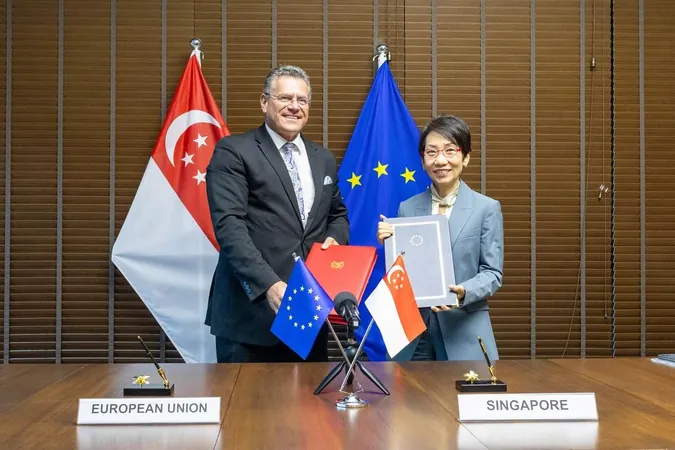
Singapore and EU Unite for a Groundbreaking Digital Trade Pact Amid Global Challenges
2025-05-07
Author: John Tan
In a bold move to enhance digital cooperation, Singapore and the European Union have officially signed a transformative digital trade agreement on May 7. This pact aims to streamline online transactions, providing much-needed clarity and legal assurance for consumers and businesses engaging across borders.
The signing ceremony took place at The Treasury in High Street, with Singapore's Minister-in-charge of Trade Relations, Grace Fu, and EU Commissioner for Trade and Economic Security, Maros Sefcovic, taking the stage to formalize the European Union-Singapore Digital Trade Agreement (EUSDTA). This agreement is a valuable addition to the EU-Singapore Free Trade Agreement (EUSFTA) that has been in effect since 2019.
The EUSDTA sets ambitious global standards for digital trade and aims to eliminate unjustified barriers to cross-border data flows. It encompasses regulations covering electronic signatures, spam control, and cybersecurity, ultimately driving down operational costs for businesses and spurring growth in the digital services sector.
As Singapore's fifth-largest goods trading partner, the EU saw bilateral trade soar past $100 billion in 2024, contributing to 7.8% of Singapore's total goods trade. The EU also ranks as Singapore’s second-largest services trading partner, with service exchanges surging beyond $110 billion in 2023.
Investment dynamics are equally promising, with the EU being Singapore’s second-largest foreign investor, making it a pivotal destination for overseas investments.
Minister Fu hailed the EUSDTA as a critical advancement in the digital economic partnership between Singapore and the EU, particularly in light of ongoing global uncertainties. "This agreement reflects our mutual dedication to cultivating a secure and inclusive digital economy, creating fresh opportunities for businesses and citizens alike," she declared.
The EUSDTA represents Singapore's key contribution to the EU's digital economy framework, following similar agreements with other nations, such as Australia and South Korea, which set collaborative standards for digital trade.
The World Trade Organization reports that global digital service exports have skyrocketed to over $4.2 trillion in 2023, marking a 9% growth from the previous year. This accelerated growth in digitally delivered services has eclipsed traditional goods and services trade.
The EUSDTA facilitates easier data transfers, establishing a supportive legal framework designed to protect individual personal data while allowing seamless electronic commerce. It encourages innovation by ensuring businesses can operate without the fear of compromising their proprietary software.
This agreement also champions consumer protection, implementing measures to safeguard against misleading and deceptive illicit commercial activities in e-commerce.
Recognizing the significant role of small and medium-sized enterprises (SMEs), both Singapore and the EU are committed to enhancing their participation in the digital trade landscape. Nele Cornelis, Executive Director at EuroCham Singapore, emphasizes that this partnership marks a turning point for fostering a collaborative environment between governments and businesses.
Industry leaders, including Kok Ping Soon from the Singapore Business Federation, are optimistic that the EUSDTA will unlock new avenues for sectors like e-commerce and financial services.
The agreement also excites fintech firms like Nium, who highlight the need for reliable cross-border data flows and aligned payment systems to provide uninterrupted service between regions.
With the EUSDTA in place, Singapore and the EU are poised to reshape the digital trade landscape, paving the way for more efficient, robust, and secure cross-border commerce.






 Brasil (PT)
Brasil (PT)
 Canada (EN)
Canada (EN)
 Chile (ES)
Chile (ES)
 Česko (CS)
Česko (CS)
 대한민국 (KO)
대한민국 (KO)
 España (ES)
España (ES)
 France (FR)
France (FR)
 Hong Kong (EN)
Hong Kong (EN)
 Italia (IT)
Italia (IT)
 日本 (JA)
日本 (JA)
 Magyarország (HU)
Magyarország (HU)
 Norge (NO)
Norge (NO)
 Polska (PL)
Polska (PL)
 Schweiz (DE)
Schweiz (DE)
 Singapore (EN)
Singapore (EN)
 Sverige (SV)
Sverige (SV)
 Suomi (FI)
Suomi (FI)
 Türkiye (TR)
Türkiye (TR)
 الإمارات العربية المتحدة (AR)
الإمارات العربية المتحدة (AR)